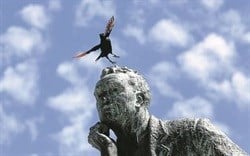The uproar at the University of Cape Town (UCT) over the relocation or removal of a prominent statue of Cecil John Rhodes has so far been enormously beneficial for the institution. Fresh political and intellectual energy has been unleashed in an organisation that is usually resistant to change...

Image credit: The Times
The protests have been almost entirely peaceful, and there has been little damage to property. Students have reiterated their respect for education and for many of the wider goals of the institution.
Black students are speaking out frankly about the shortcomings of UCT's transformation strategy. They have also explained why they are better placed than their lecturers to understand their own experiences of being black.
However, it is perhaps among many white students that change has been most marked. Most white undergraduates have long been aware of the more obvious dimensions of their privilege: affluent suburban backgrounds, well-resourced schools, and the societal dominance of their home languages.
Now many of them are contemplating less obvious aspects of their advantage: an expectation that when they underperform it will not be attributed to their race; a capacity to succeed that is not attributed by others to affirmative action; a happy expectation that potential employers will assume they are competent because of their skin colour; and an ease in negotiating the legacies of colonialism and white domination.
Meanwhile, academic staffers have been making an unprecedented effort to listen to and learn from students rather than to talk at them.
The long-term ramifications
Despite these gains, it is not clear that the protest's longer-term ramifications will be so positive. First, it is only a possibility that fresh life will be given to UCT's "transformation" project: its efforts to recruit and promote black academic staff, to rethink the curriculum, and to make the university a place that is experienced (in UCT's own words) as "inclusive and nurturing" by all of its staff and students.
These dimensions of change involve complex trade-offs, the building of trust and consensus and lots of hard work. The line between agitation for change and complacent inactivity has been very fine at UCT in the past.
Second, the student leadership has been very impressive over recent weeks, but it inevitably contains some ambitious political entrepreneurs. Their career interests will not be best served by a commitment to longer-term institutional transformation, but rather by projecting the Rhodes statue controversy onto a wider national stage.
Finally, UCT's executive officers probably took a decision relatively early to move the statue, and then organised discussions in the wider university community to render that decision legitimate. This decision was perhaps prudent. In an unfortunate oversight, however, UCT has not really offered compelling intellectual arguments for the removal or relocation of the statue.
The triumph of forgetting over memory will not, however, come easily. As my colleagues in the humanities faculty have commented frequently in recent days, the statue is a symbol or a metaphor that represents the wider lack of transformation at UCT.
But it is also a statue. The National Heritage Resources Act characterises public monuments as part of the national estate and as protected by law. No structure older than 60 years can be altered without first securing the permission of a heritage authority. Vice-Chancellor Max Price's claim that UCT's council can unilaterally and quickly decide to move it is probably incorrect.
The longer the protests continue, the greater the danger that participating students' academic performance will be compromised. And the good fortune and organisational discipline that have so far averted serious injury to students, security workers and staff will not hold forever.





































